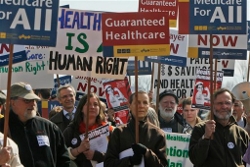VOICES: Support grows for the choice of a public health insurance plan
By the Progressive States Network
 According to a January 2009 Lake Research Partners public opinion poll conducted on behalf of Health Care for America NOW!, 73% of "voters overwhelmingly want everyone to have a choice of private health insurance or a public health insurance plan." The Herndon Alliance has highlighted key messages for why the public supports a choice of a public health insurance option that will help ensure all Americans have access to quality and affordable health coverage.
According to a January 2009 Lake Research Partners public opinion poll conducted on behalf of Health Care for America NOW!, 73% of "voters overwhelmingly want everyone to have a choice of private health insurance or a public health insurance plan." The Herndon Alliance has highlighted key messages for why the public supports a choice of a public health insurance option that will help ensure all Americans have access to quality and affordable health coverage.
Newspapers, from the New York Times to the Des Moines Register, back the creation of a public health insurance option as "exactly what the country needs" (DMR). President Obama and his Administration's support for a public health insurance plan remains steadfast, but equally if not more important is the growing commitment from members of Congress and state legislators to comprehensive health care reform that includes the choice of public or private health insurance.
Congressional Support for a Public Plan: Representing 117 members of Congress, leaders of the Progressive Caucus, the Black Caucus, the Hispanic Caucus, and the Asian Pacific American Caucus sent joint letters to President Obama and Congressional Leadership in the House and Senate asserting that "our support for enacting legislation this year to guarantee affordable health care for all firmly hinges on the inclusion of a robust public health insurance plan like Medicare." And, a group of 21 US Senators, at last count, sent a letter to key committee chairs announcing their support for a public health insurance option and outlined how it could help reduce costs, improve quality, and achieve health care for all.
State Resolutions Supporting the Public Plan: Several state legislatures and chambers have passed resolutions supporting federal reform and, specifically, the choice of a public health insurance option. The Arkansas Legislature passed HCR1019 which calls for a "national solution to healthcare reform for America" and includes a "choice of health insurance plans, including the right to keep current insurance, choose another private plan, or join a public health insurance plan." A similar resolution, HR313, is moving through the Illinois Legislature. Earlier this year, the Iowa Senate passed SR13 which articulated many priorities for federal reform including guaranteeing affordable coverage for all US residents "using private market and publicly financed plans."
Political Support for Reform Yields Industry Concessions: The mere prospect of federal reform creating a public plan option has forced the health care industry to make a string of concessions to President Obama and Congressional health care leaders, a point the Des Moines Register noted in its editorial supporting the choice of a public plan.
And there's an added bonus to creating a public plan: private-sector plans will do better by patients, because they'll have more competition. Just talk of creating a government plan has the industry offering to cut rates and welcoming oversight. Imagine how nice it will play when Congress actually creates such an option.
As part of its campaign to prevent Congress from creating a public plan, the health insurance industry lobby last week offered to end gender-based rating -- where women pay higher rates for health insurance. The lobby had previously said it would stop denying coverage to sick people and would stop charging higher premiums for Americans with a history of health problems. The caveat, of course, is that the industry would agree to these concessions if all Americans are required to have insurance coverage. Such a mandate absent the choice of a public plan and robust affordability measures would be akin to a subsidy for the private, for-profit health insurance industry.
The industry's latest concession is a "voluntary" commitment from key stakeholders -- health insurers, drug makers, hospitals, and doctors -- to reduce the growth of health care costs by $2 trillion over the next ten years.
 Using Choice of a Public Plan to Institutionalize Industry Commitments to Cost Reductions: These industry concessions are significant and welcome, yet voluntary commitments do not provide government and taxpayers with authority to ensure commitments are kept once the political focus on reform subsides. Reform, whether promised or legislated, must be backed up by the law.
Using Choice of a Public Plan to Institutionalize Industry Commitments to Cost Reductions: These industry concessions are significant and welcome, yet voluntary commitments do not provide government and taxpayers with authority to ensure commitments are kept once the political focus on reform subsides. Reform, whether promised or legislated, must be backed up by the law.
Although the health insurance lobby rejects the "premise that to keep the plans honest you need a public program," Congress increasingly recognizes that insurance reform alone, including the concessions made by the health insurance industry, is not, indeed, enough to keep the private industry "honest." As the 21 (and counting) US senators wrote in their letter:
 According to a January 2009 Lake Research Partners public opinion poll conducted on behalf of Health Care for America NOW!, 73% of "voters overwhelmingly want everyone to have a choice of private health insurance or a public health insurance plan." The Herndon Alliance has highlighted key messages for why the public supports a choice of a public health insurance option that will help ensure all Americans have access to quality and affordable health coverage.
According to a January 2009 Lake Research Partners public opinion poll conducted on behalf of Health Care for America NOW!, 73% of "voters overwhelmingly want everyone to have a choice of private health insurance or a public health insurance plan." The Herndon Alliance has highlighted key messages for why the public supports a choice of a public health insurance option that will help ensure all Americans have access to quality and affordable health coverage.Newspapers, from the New York Times to the Des Moines Register, back the creation of a public health insurance option as "exactly what the country needs" (DMR). President Obama and his Administration's support for a public health insurance plan remains steadfast, but equally if not more important is the growing commitment from members of Congress and state legislators to comprehensive health care reform that includes the choice of public or private health insurance.
Congressional Support for a Public Plan: Representing 117 members of Congress, leaders of the Progressive Caucus, the Black Caucus, the Hispanic Caucus, and the Asian Pacific American Caucus sent joint letters to President Obama and Congressional Leadership in the House and Senate asserting that "our support for enacting legislation this year to guarantee affordable health care for all firmly hinges on the inclusion of a robust public health insurance plan like Medicare." And, a group of 21 US Senators, at last count, sent a letter to key committee chairs announcing their support for a public health insurance option and outlined how it could help reduce costs, improve quality, and achieve health care for all.
State Resolutions Supporting the Public Plan: Several state legislatures and chambers have passed resolutions supporting federal reform and, specifically, the choice of a public health insurance option. The Arkansas Legislature passed HCR1019 which calls for a "national solution to healthcare reform for America" and includes a "choice of health insurance plans, including the right to keep current insurance, choose another private plan, or join a public health insurance plan." A similar resolution, HR313, is moving through the Illinois Legislature. Earlier this year, the Iowa Senate passed SR13 which articulated many priorities for federal reform including guaranteeing affordable coverage for all US residents "using private market and publicly financed plans."
Political Support for Reform Yields Industry Concessions: The mere prospect of federal reform creating a public plan option has forced the health care industry to make a string of concessions to President Obama and Congressional health care leaders, a point the Des Moines Register noted in its editorial supporting the choice of a public plan.
And there's an added bonus to creating a public plan: private-sector plans will do better by patients, because they'll have more competition. Just talk of creating a government plan has the industry offering to cut rates and welcoming oversight. Imagine how nice it will play when Congress actually creates such an option.
As part of its campaign to prevent Congress from creating a public plan, the health insurance industry lobby last week offered to end gender-based rating -- where women pay higher rates for health insurance. The lobby had previously said it would stop denying coverage to sick people and would stop charging higher premiums for Americans with a history of health problems. The caveat, of course, is that the industry would agree to these concessions if all Americans are required to have insurance coverage. Such a mandate absent the choice of a public plan and robust affordability measures would be akin to a subsidy for the private, for-profit health insurance industry.
The industry's latest concession is a "voluntary" commitment from key stakeholders -- health insurers, drug makers, hospitals, and doctors -- to reduce the growth of health care costs by $2 trillion over the next ten years.
 Using Choice of a Public Plan to Institutionalize Industry Commitments to Cost Reductions: These industry concessions are significant and welcome, yet voluntary commitments do not provide government and taxpayers with authority to ensure commitments are kept once the political focus on reform subsides. Reform, whether promised or legislated, must be backed up by the law.
Using Choice of a Public Plan to Institutionalize Industry Commitments to Cost Reductions: These industry concessions are significant and welcome, yet voluntary commitments do not provide government and taxpayers with authority to ensure commitments are kept once the political focus on reform subsides. Reform, whether promised or legislated, must be backed up by the law.Although the health insurance lobby rejects the "premise that to keep the plans honest you need a public program," Congress increasingly recognizes that insurance reform alone, including the concessions made by the health insurance industry, is not, indeed, enough to keep the private industry "honest." As the 21 (and counting) US senators wrote in their letter:
"An insurance market that allows for healthy, fair, and robust competition between publicly-administered and privately-administered insurance, allowing those who are satisfied with their coverage to keep what they have. Let Americans choose which option is best for them."An alternative to private insurance will help keep that industry honest, while providing a mechanism for advancing quality-enhancing and cost-cutting strategies essential to the future viability of our health care system.
